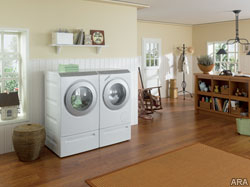(ARA) – What’s the one natural resource you rely on most in a day? If you think about it from the first things you do in the morning, to the chores you do, to the last things you do to wrap up your day, you’ll likely conclude it’s water. We use it for showering, brushing teeth, flushing the toilet, washing dishes, cleaning, cooking, drinking and more – without water, we’d be lost. The problem is, high demand is leading to concerns about water shortages. With fresh water supplies diminishing because of misuse and pollution, the worldwide water crisis will eclipse many other environmental issues in the coming years. That’s why it’s so important to learn what your water footprint is and how you can begin reducing it now.
Your water footprint – how much water you use on a daily, weekly or monthly basis – might be a lot bigger than you think. If you tend to go about your daily activities without considering how much water is literally going down the drain, it’s likely that there’s room for improvement. The good news is that there are plenty of easy fixes that can help you reduce your water footprint. Here are a few ideas to help you get started:
* In the laundry room: The average American household uses 16,000 gallons of water each year, just on laundry, so it’s a major factor in your footprint. One way to cut back on water usage in the laundry room is to use a high-performance front-loading washing machine. They typically use far less water than top-loaders, and washers from Miele use less than 13 gallons – which is less than other Energy Star-rated washing machines. Also, take a thoughtful approach to how you run the washer – only use it for full loads, unless the unit is equipped with a load recognition sensor that only fills the washer with enough water to manage that load.
It’s also important to have a washer that treats your clothes well. Your clothes themselves affect your water footprint – it takes 3,600 gallons of water to produce just a single cotton T-shirt and a pair of jeans. In addition to saving on water, all Miele’s front-loading washers treat clothes gently with their patented honeycomb drum technology, that is proven to extend the life of clothes up to four times longer than other washers. The fewer clothes you buy, the smaller your water footprint. It also lessens strain on your wallet.
* In the bathroom: Long, hot showers might feel good after a long day, but they’ll expand your water footprint quickly. Limit the amount of time you spend in the shower by setting a timer – or keep a clock in your bathroom so you can watch the time. If you have the option to do a bit of remodeling in your bathroom, consider installing a new toilet that offers a dual flush option (a half flush and a whole flush). By using the half flush option more frequently, you’ll save a good deal of water. Other water-saving steps include installing a high-efficiency showerhead and turning off the water as you brush your teeth and wash your face.
* In the kitchen: Think back to how you approach washing clothes, and apply it to your dishwasher – make sure you’re washing a full load and using the most efficient setting. If your machine is more than 10 years old, consider replacing it with a new water- and energy-efficient model.
* Throughout the house: Your water footprint might be expanding without you even knowing it, due to leaky pipes – do a quick check around the house and repair any leaks. While you’re making the rounds, take the time to install aerators or low-flow faucets on all sinks. Keep in mind in that, in addition to being good for the environment, saving water can also help you save money, too.
* In the outdoors: Having a nice lawn can improve the look of your home and your whole neighborhood, but it’s essential to be smart about watering. If you need to water, do so early in the morning or at dusk to cut back on evaporation. Consider switching to drip irrigation as an effective and more efficient alternative to sprinkler systems. Installing a rain barrel to catch the water that nature delivers for free is another great idea – you can then use the collected rainwater to refresh your garden.
From your washing machine to your garden, some simple adjustments can shrink your water footprint to a more earth-friendly size. For more information about saving water, visit the EPA’s WaterSense website at www.epa.gov/watersense; or to learn about how much water goes into making your clothes and how best to protect them, visit www.mieleusa.com.

